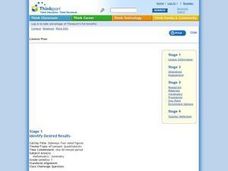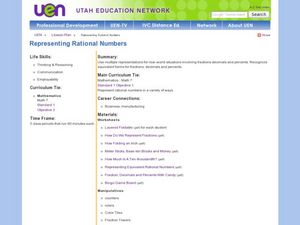Curated OER
How Much is a Million?
Students discover the magnitude of the number 100. The sense of the number is developed by allowing students to experience 100 by counting it, measuring it, feeling it, and doing it, hands-on
Curated OER
A Statistical Study of Three Biomes
Students collect data from one of three selected biomes. Data are then organized and statistically analyzed. This project engages students of different backgrounds grouped cooperatively in a relevant outdoor hands-on learning experience.
Curated OER
Quadrilaterals: Four-sided Figures
Fifth graders engage in a variety of hands-on and technology-rich activities involving the classification of quadrilaterals. They utilize protractors and rulers to investigate the characteristics of various types of quadrilaterals. They...
Curated OER
Roll or Slide?
Students explore models of three-dimensional shapes. In this geometric shapes instructional activity, students use hands-on manipulatives to explore three-dimensional shapes. Students predict whether each shape will roll or slide.
Curated OER
Up For Change?
Students explore similar objects. They participate in a series of hands-on, multimedia and online activities to examine how the edge length affects the angle measures, perimeters and areas of similar regular polygons. Students find the...
Curated OER
Density Derby
Students explore the relationship between mass, volume and density. They use model boats to discover how changing mass and volume affect density. This is a very engaging lesson which provides great demonstrations and hands-on activities.
Curated OER
TE Activity: Hot Cans and Cold Cans
Students work on problems in which they investigate conduction, convection, and radiation. They attempt to maintain the warmth in one can of soda while cooling the other as much as possible in a thirty minute period. They examine how...
Curated OER
TE Activity: Muscles, Muscles Everywhere
Young scholars study three different muscle types and investigate the affect of space travel on astronauts' muscles. They examine how exercise has a positive affect on muscle both on Earth and in space while looking at engineers' roles...
Curated OER
TE Activity: The Beat Goes On
Students determine what the pulse is before examining how to measure the heart rate in different situations. They build a simple device that measures the heart rate, take heart rates, and record them on a worksheet. They discuss how...
Curated OER
TE Activity: Sound Line
Students investigate the decibel readings of various noises. They determine why high-level readings damage hearing. Students arrange sound from the lowest to highest decibel levels when they written on a piece of paper.
Curated OER
Plants and Animals, Partners in Pollination
Students participate in multiple hands-on activities to explore reproduction and pollination. In groups, using a cotton swab and powder, students simulate being pollinators and plants. They name the parts of the flowers and the function...
Curated OER
Here Today, Gone Tomorrow
Students explore erosion. Through multi-media and hands-on activities, students identify the effects of wave erosion and hurricanes on a barrier island. Students watch a video and create a cause and effect chart of their observations. ...
Curated OER
Awareness of Pre-algebra Concepts
Students demonstrate different algebraic equations using Borenson's Hands-On Equation materials. They work in a cooperative group to solve algebraic equations.
Curated OER
Time Activity: A Saturday Schedule
For this time worksheet, students make a schedule for activities on a Saturday, then draw the start times for each activity on the face of a clock. Answers included on page 2.
Curated OER
Activity Plan 4-5: Opposites Attract!
Students experiment with magnets and sort objects based on magnetism. In this hands-on physical science lesson, the children are introduced to magnetism through discussion and experimentation and have the opportunity to use different...
Curated OER
Representing Rational Numbers
Seventh graders explore rational numbers. In this fractions, decimals, and percents instructional activity, 7th graders identify and compare equivalencies between fractions, decimals, and percents. Students use hands-on activities to...
Curated OER
Half Life Analogy
Eighth graders explain half life. In this hands on activity, 8th graders use licorice to explain radioactive decay and graph their results.
Curated OER
Sextant Solutions
Middle schoolers explore ways a sextant can be a reliable tool that is still being used by today's navigators and how computers can help assure accuracy when measuring angles. This activity will show how computers can be used to...
Teach Engineering
Basically Acids
Base your lesson plan on acids and bases on an informative resource. The first installment of a five-part module on the science behind Harry Potter has individuals investigate acid/base chemistry with the use of invisible inks. They also...
Odyssey of the Mind
Odyssey of the Mind Curriculum Activity: Shape-Shifter
Geometry is everywhere, and I mean everywhere! Those skillful mathematicians discuss shapes and then come up with a well-researched list of shapes seen in everyday applications. They put their knowledge of shapes to work as each small...
Curated OER
Time
Three time-telling activities help scholars comprehend analog clocks on the hour. First, they write in the time displayed on three clock faces. Beginners to this concept only write in digits, as the o'clock is already written for...
Curated OER
What's the Time? #2
Challenge your class's time-telling skills with fifteen analog clocks, all with blank faces. They write the hands in the correct places, all with times to the nearest five minutes. An easy way to extend this assignment would be a group...
Curated OER
Multiplication Mysteries
Arithmetic apprentices practice problem solving and multiplication with a lift-the-flap pair of reproducibles. In this Halloween mathematics lesson plan, math monsters practice multiplication by making candy corn calculations. They...
EngageNY
Margin of Error When Estimating a Population Proportion (part 1)
Use the power of mathematics to find the number of red chips in a bag — it's a little like magic! The activity asks learners to collect data to determine the percentage of red chips in a bag. They calculate the margin of error and...

























